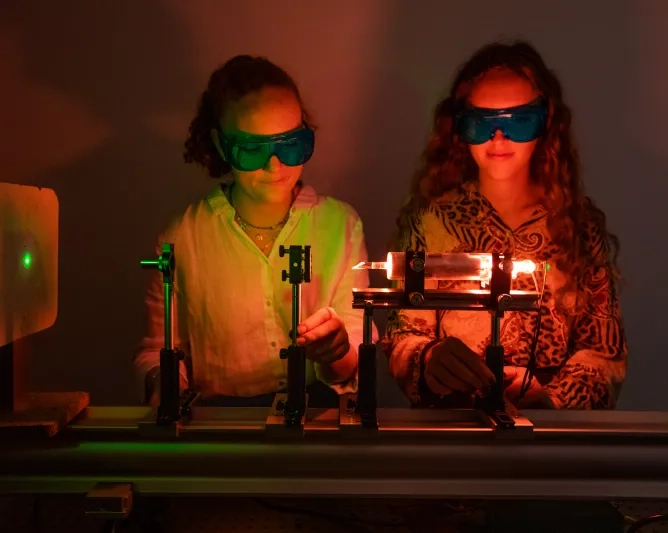International Masters

Aside from being taught by experts in their respective fields, international masters courses offer a dynamic approach to learning and facilitate the personal and multicultural growth of students, including in-depth exploration of a foreign language.
Furthermore, this opportunity allows students to engage in high-level training at renowned educational and research institutions worldwide. Alongside rigorous scientific education, students acquire valuable assets for research and the engineering field on a global scale.
Master’s degree in physics – typical pathway: Europhotonics
The first year serves as an introduction to photonics, focusing on the fundamental principles (electromagnetism, physical optics, and optoelectronics).
The second year (M2) emphasizes the practical application of this knowledge through two highly professional semesters.
The first semester of Master 2 covers the following subjects:
- Quantum optics
- Laser sources and their applications
- Biophotonics
- Nanophotonics
- Optical instrumentation
- Astronomy and numerical methods for modelling the physical phenomena covered.
During this semester, students also spend seven weeks as apprentices in laboratories affiliated with the course.
The second semester of Master 2:
- A 4–6-month placement in a laboratory or in industry, providing a significant work experience and a first professional experience
The objective of the Europhotonics program is to equip students with the skills necessary to pursue careers in optics and photonics, electromagnetism, remote sensing, image processing, telecommunications, imaging in various environments, and instrumentation. The main application areas are in the medical, space, defence, and industrial control sectors.
The strength of the POESII-Europhotonics program lies in its extensive network of partner laboratories, including four research laboratories at AMU and multiple laboratories at our German and Spanish partners.
The professionalization aspect of the course, which includes work placements and industry projects, enables students to seamlessly transition into the workforce upon completion of their studies. The Europhotonics Master's program combines the latest industry trends with international research advancements.
While the M2 builds upon the foundations of the M1 Europhotonics pathway, students with an M1 in a Physics-focused major or who have completed a third year of engineering school can also enrol.
WAVES Master
The WAVES study programme takes place over a two-year period.
Each of the 4 semesters corresponds to 30 ECTS and enables students to become competent in the following applications:
- Urban noise
- Acoustic insulation
- Integrated health monitoring
- Non-destructive testing and non-linear acoustic systems.
These subjects carry significant weight in the field of acoustics at international level.
The WAVES Master's programme focuses on the transmission of a wide range of expertise, combining the theoretical framework with experimental methodology and numerical modelling, in order to provide students with the knowledge and tools they need to design, characterise, model and understand acoustic systems and devices.
To meet the sophisticated challenges of acoustics, the WAVES Master's programme draws on its international nature to impart fundamental and transdisciplinary knowledge of acoustics, while mobilising a range of multidisciplinary skills.
As a consequence, WAVES graduates will emerge as a new cohort of scientific leaders with a profound capacity to adapt to novel professional contexts and confront the moral, environmental, and societal challenges associated with sound science.
The interdisciplinary nature of the WAVES Master's program is reinforced by instructors and educators from four distinct institutions. The initial semester is spent at the University of Coimbra in Portugal, followed by the second semester at the Polytechnic University of Valencia in Spain, and the third semester in Marseille with Aix-Marseille Université and Centrale Méditerranée (AMU-ECM). Each of these semesters focuses on specific domains but is not confined to them.
The fourth semester is dedicated to the preparation of the Master's thesis through an internship.